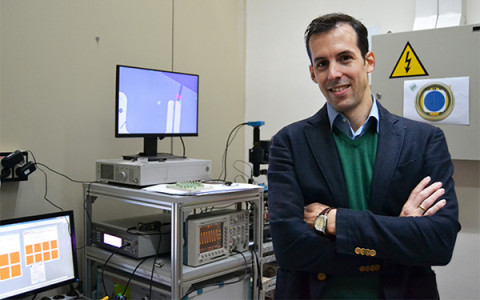A researcher from the ICMM-CSIC obtains 2 million euros to develop thermal modulators that enhance the performance of batteries

Miguel Muñoz Rojo, a researcher at the Spanish National Research Council (CSIC) at the Institute of Materials Science in Madrid (ICMM), has secured one of the prestigious and highly competitive Consolidator Grants from the European Research Council (ERC) to investigate new approaches to advanced heat management in batteries using solid-state thermal modulators. For this project, the scientist has obtained funding of two million euros.
To explain the nature of his work, the researcher uses an analogy with electricity: "We know we have transistors, diodes, or switches to control it," he points out. However, when it comes to heat, solid-state devices for managing that energy are mainly limited to resistors and capacitors. "To enhance our capabilities for heat management, storage, or recovery, we must develop more advanced devices, such as thermal switches, modulators, or transistors," he indicates.
His work begins with a question: "How can we develop a material that dynamically changes its thermal properties and can switch from being a conductor to an insulator, or vice versa?" Muñoz Rojo notes that heat is transported through energy packets without mass or charge that cannot be controlled with electromagnetic fields, making this issue "truly complex." In fact, he has been working on this for several years, during which he has been affiliated with various international research centers, such as Stanford University (USA) and the University of Twente (Netherlands), sharing the latter affiliation with the CSIC. This has led him to the solution he will explore thanks to this Consolidator Grant: "In general, the process of obtaining an ERC is a marathon," he mentions.
Specifically, Muñoz Rojo's proposal is based on the study of "relatively new" materials, metallic carbides (MXenes): "We are going to use the properties of these materials to develop an electrochemical thermal modulator." The researcher explains that this new thermal modulator or switch will have advanced functionalities and will find applications in technologies related to heat management.
Its main application will be dedicated to managing the heat of batteries to make them operate almost isothermally. "By enabling almost isothermal operation of batteries, you improve their performance and extend their lifespan," emphasizes the scientist, noting that this is crucial for the future electrification, "in which batteries will play a significant role in contributing to a greener world." For instance, "A battery that operates at 60°C may experience a capacity loss of 20% in just 600 cycles, while the same battery at 25°C would have a degradation of only 4%." The improvement is clear for battery performance, but also for the safety of users, as these degradations "can be dangerous for users, sometimes leading to explosions."
Muñoz Rojo will assemble a research team of five members who will study with him how to create these devices on a large scale. "The key for me was not only to do something fundamental in basic science but to have an impact on society," he notes. Thinking about this impact, the scientist is already working on other heat management projects with leading companies and is forming international working groups focused on implementing and analyzing the future of these new materials.
Instituto de Ciencia de Materiales de Madrid (ICMM)
Sor Juana Ines de la Cruz, 3
Cantoblanco, 28049
Madrid, España
Telephone: (+34) 91 334 90 00
Email: @email
Communication Office: @email

Acknowledge the Severo Ochoa Centres of Excellence program through Grant CEX2024-001445-S/ financiado por MICIU/AEI / 10.13039/501100011033

Contacto | Accesibilidad | Aviso legal | Política de Cookies | Protección de datos
